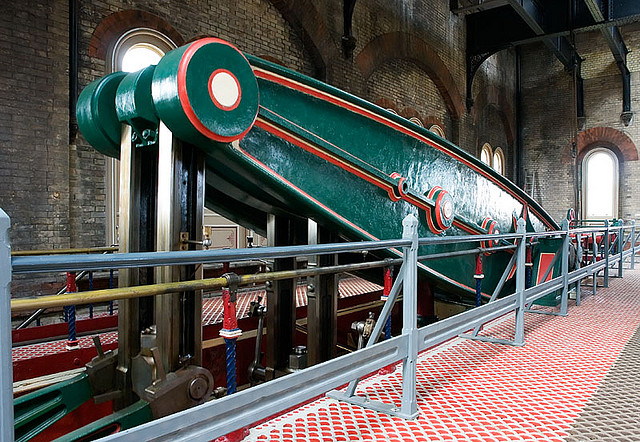« Three Farmhouses: A Study in Passive Solar Design | Home | Why Systems Thinking? »
The Future of Industrial Society: “Progress”, A Microscopic Scientific Paradigm, and Blowback
By Karl North | January 2, 2014
Nothing is more important to understanding the behavior of a large social entity than awareness of its collective worldview. Usually that worldview is so deeply embedded and taken for granted that its inhabitants rarely know that it exists and shapes their individual and collective behavior in many ways. A common parallel is fish who do not know that the water that touches their noses is water, because they have never experienced open air. For anything in our world to have meaning, we must be able to compare it with some alternative.
One of the most deeply embedded elements of the collective worldview in industrial society is the notion that unending progress is normal behavior in all human societies.
Working in tandem with this belief is the hard fact that our peculiar form of economy becomes unstable and prone to collapse without economic growth:
- Our form of economy breeds inequality, so enough economic growth must occur to allow private capital its profits and still provide a trickle down to pacify the discontent that results from increasing inequality.
- Our form of economy relies on private capital to allocate the investment necessary not only for growth, but merely to sustain the economy at any given level. The capitalist class, the class that has enough discretionary wealth to permit investment, has the right in our form of economy to be paid simply for renting out its capital, and will not invest unless it receives this “interest”. Hence, because our economy relies on private capital, it must “progress” sufficiently to pay the rent on the use of that capital.
Without growth to pay the rent on private capital, our economy stalls and begins to collapse. Economists are therefore acutely aware of the intrinsic need for growth in the peculiar way capitalist society is organized. They have therefore made the notion a cornerstone of their ideology and have done their best to make it central to our worldview. The organization of a society around the need to pay rent/interest is peculiar to modern society because, for long periods in earlier civilizations, debt at interest was known as usury, and was banned or carefully constrained. In capitalism however, debt paid with interest is the main profit-generating mechanism, its heart and soul as it were, and when no longer functional, leads to heart failure.
Progress is so entrenched as to have become a quasi religious belief, as in the proclamations of our leaders that “The American way of life is non-negotiable”. Hence many students of our society who see that progress has nefarious consequences in time and space are coming to the conclusion that we are likely to pursue progress to its bitter end.
My goal here is to explore how our way of doing science reinforces the belief in material progress as a normal trend, so that we revere the technological products of science despite their violation of the laws of nature. The many negative consequences that follow from these violations often come later in time (our children’s lifetime) or more distant in space (those living downstream), which makes it easier to ignore them. In my title I refer to these consequences as “blowback” because they are inevitable and intrinsic to any society whose collective consciousness is fixed and intent on unending growth. I will conclude that progress as we know it contains the seeds of the end of industrial civilization.
A Way of Doing Science
The world we know consists of a web of interacting elements and forces, some strongly related, some more weakly. If we are to understand the consequences of our actions in such a world, our approach to knowledge must assume and acknowledge that web. For most of human history societies did acknowledge the connected nature of the universe in one way or another: as a natural world whose power and integrated structure deserved respect (pantheisms) or later as a theological whole portrayed in sacred texts (monotheisms).
However, an approach to knowledge slowly developed in Western Europe (starting around the 17th century, to put a rough date on it) that deliberately ignored the web, the systemic nature of the world and the way it works. People who eventually called themselves scientists discovered that by reducing their focus to few variables they could discover causal relationships whose consistency they could demonstrate by replicable experiments. This so-called reductive method, when applied to invention of technology, delivered such powerful results that it came to dominate inquiry into how the world works. Reverence for technologies based on this method of inquiry grew so great as to supplant religion as a source of power. Early large steam engines for example, whose invention is credited with jump-starting the industrial revolution, were often housed in massive architectural monuments as ornate in their own way as cathedrals, which reveals how society worshiped these machines.
Now, after several centuries of this quasi-religious obsession with technology, fully industrialized societies have become dependent on a panoply of technologies invented under laboratory conditions by a method that ignores their ripple effects in the web of connections that exist in the real world. A general pattern has emerged where technologies based on purely reductive science work for a while as expected, then start to produce unexpected and often unwanted results, so that they often create more problems than they solve.
The problems they have created have become so great that they are undermining our industrial way of life. As described earlier, our addiction to this way of life and the endless growth our type of economy requires appears to have locked us into a path of depletion where the industrial economy eats itself alive.
First, progress seen as economic growth depletes at an increasing rate the raw materials modern society needs not only to grow but simply to operate at the present level. Energy is the most important raw material because it is necessary for all activity, and because cheap energy permits the massive extraction and consumption of all other materials.
As the energy sources that underpin industrial civilization are becoming permanently scarcer, the material consumption we have become used to over the last two centuries will decline accordingly as a degree of deindustrialization occurs. This trend was already evident by 1970, but masked in various ways so that few were aware of it as an ultimate cause of the visible decline in quality of life.
Compounding the cannibalistic depletion process, the massive extraction and consumption of energy and other raw materials has fouled the earthly nest and disrupted local and planetary ecosystemic processes to the point where the conditions for life and our survival as a species are increasingly at risk. The damage to soils, air, aquifers, forest, fisheries, and other parts of the natural resource base that underpin modern prosperity is now well advanced.
Those chickens are now coming home to roost, and represent the blowback mentioned in the title of this essay. They are manifest in the ever increasing costs of keeping industrial society going. Hence the cost of producing many of the goods that are essential to keep industrial civilization running will soon become prohibitive. This trend is impacting discretionary consumption first, and then is gradually affecting “essentials” like cheap food, transportation, communication and housing, and many economic activities and the jobs that sustain them.
What to do? Really there is no solution, only adaptation. How to do it? The primary adaptation called for is a fundamental shift in the collective consciousness. For example, there exist other ways to do science, ways that seek to understand the world on its own systemic terms rather than the narrow ones of technological knowledge[1]. Here is one take on the question that seems to point in an appropriately holistic direction:
If we really want transformation, we have to slog through the hard stuff (history, economics, philosophy, art, ambiguities, contradictions). Bracketing it off to the side to focus just on technology, or just on innovation, actually prevents transformation.
Instead of dumbing-down the future, we need to raise the level of general understanding to the level of complexity of the systems in which we are embedded and which are embedded in us. This is not about “personal stories of inspiration” [à la TED talks, for example - KN], it’s about the difficult and uncertain work of demystification and reconceptualisation: the hard stuff that really changes how we think.[2]
I suspect that those who take this direction will find that academia has become too compartmentalized to permit the holistic, trans-disciplinary approach that is necessary. They will become an outlier intelligentsia, agitating and sharing down in the streets with everyone else. In a small way this is already happening.
[1] I discuss this point in much detail in Reductionist Science and the Rise of Capitalism: Implications for a New Educational Program of Agricultural Science at Karl North Eco-Intelligence
[2] Benjamin Bratton
http://www.theguardian.com/commentisfree/2013/dec/30/we-need-to-talk-about-ted
Topics: Political and Economic Organization, Social Futures, Peak Oil, Relocalization, Uncategorized | 2 Comments »


January 3rd, 2014 at 10:58 am
Denis, I understand and agree with your more specific use of the term “raw materials”. I am using it here as a more general term that covers anything that can be used up or dissipated to the point that it is no longer accessible at affordable cost. I also agree that the decisions made by people have no impact on entropy. I did not mean to imply anything different.